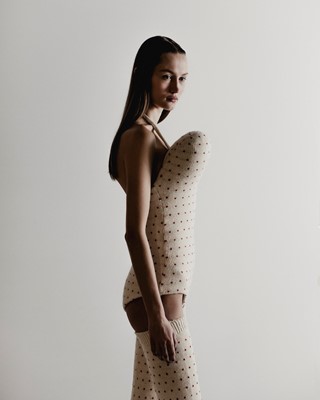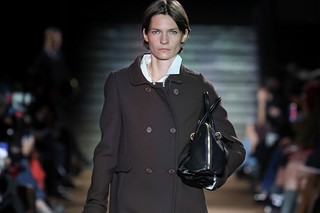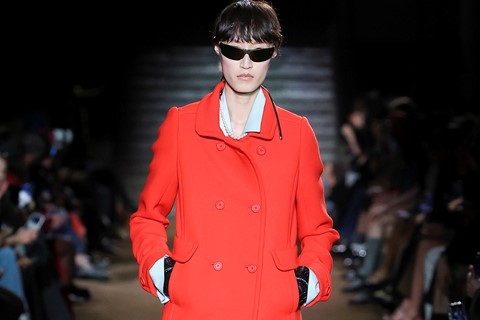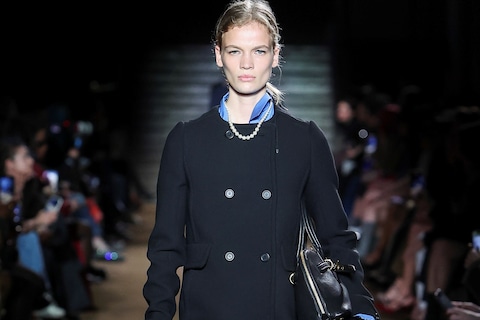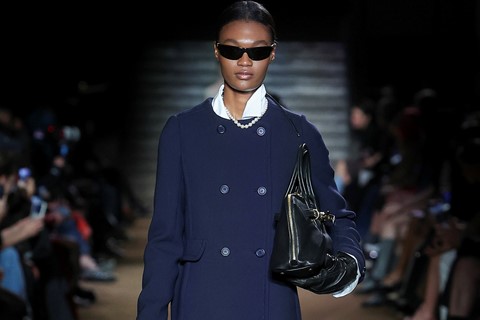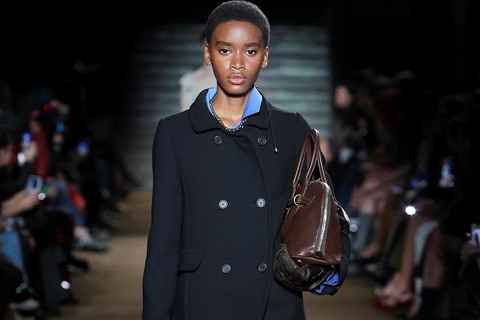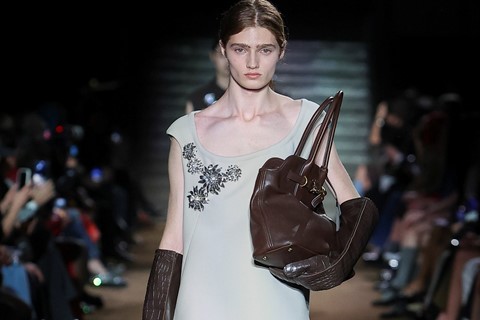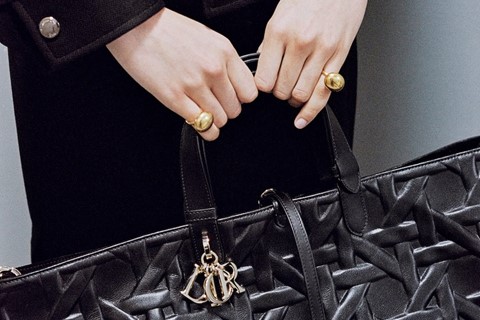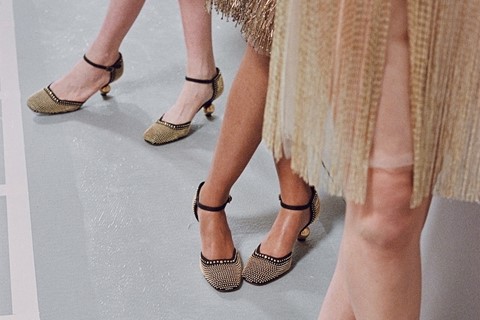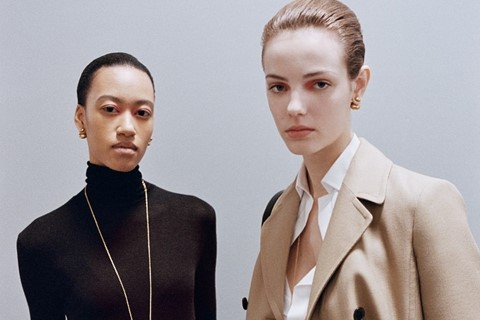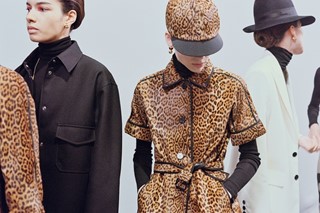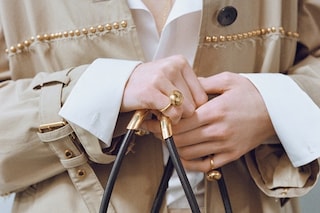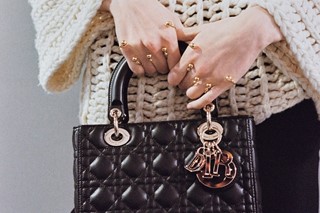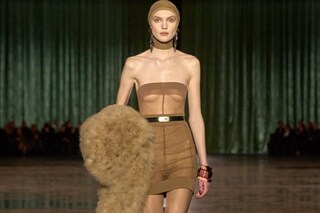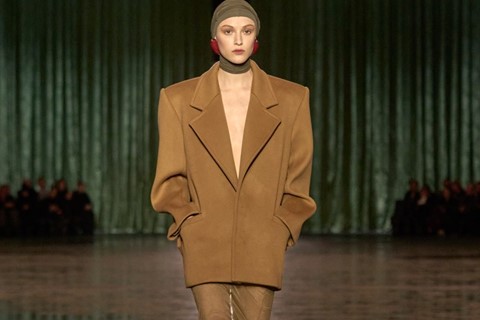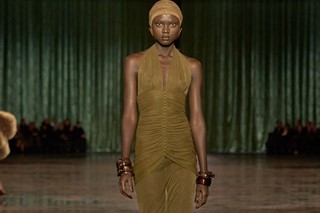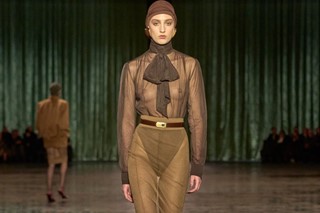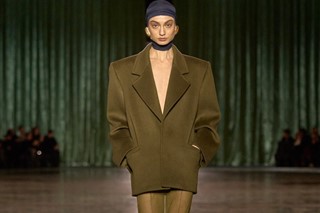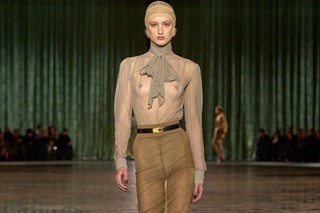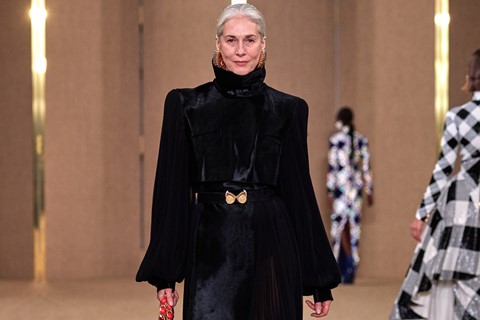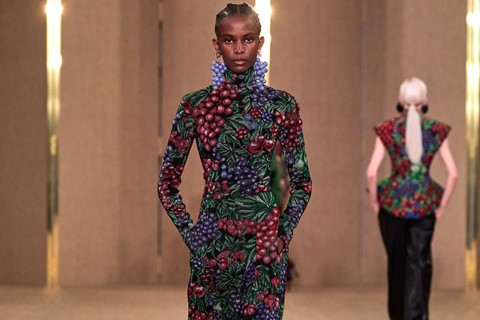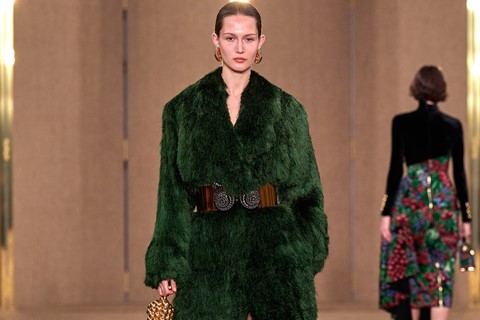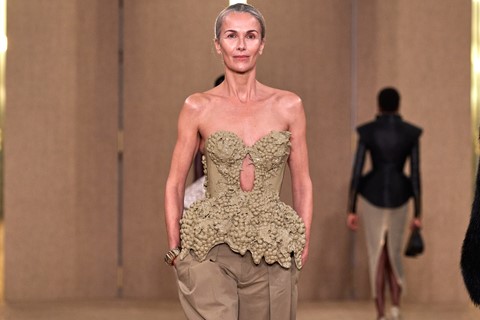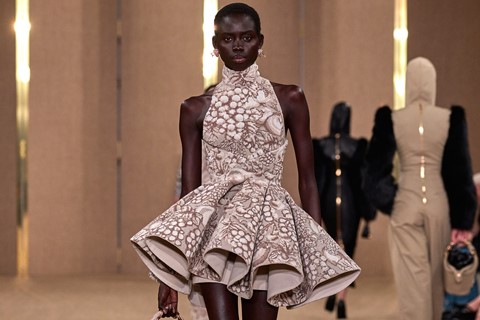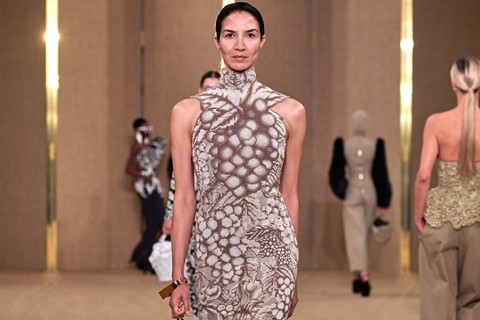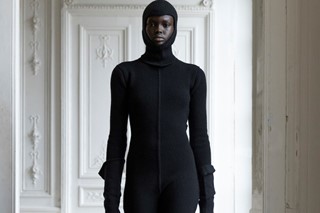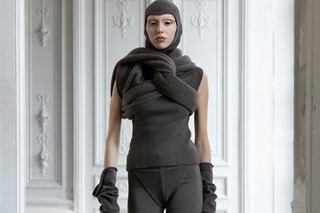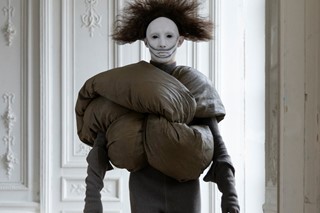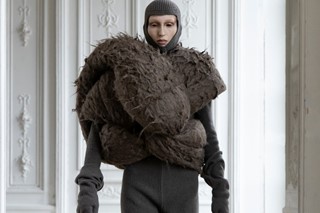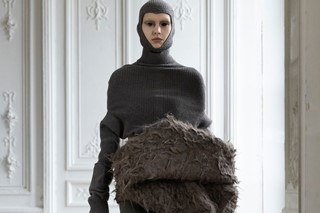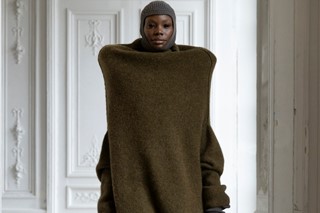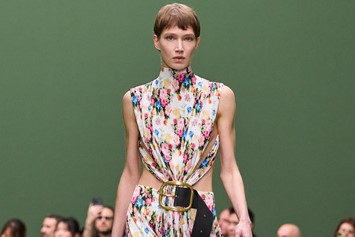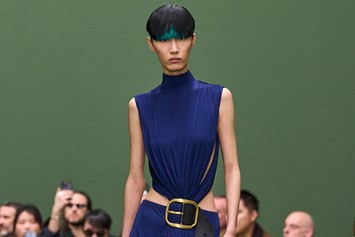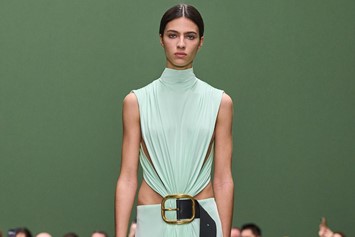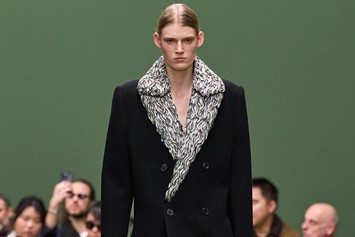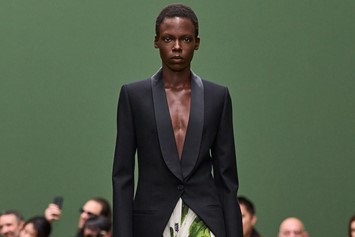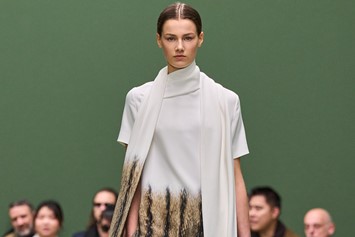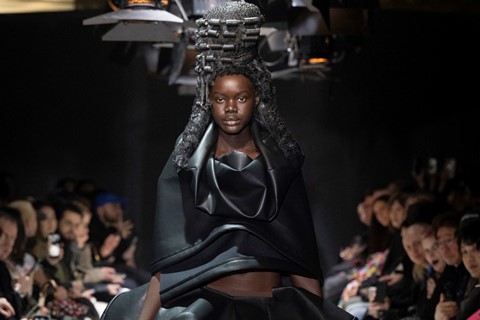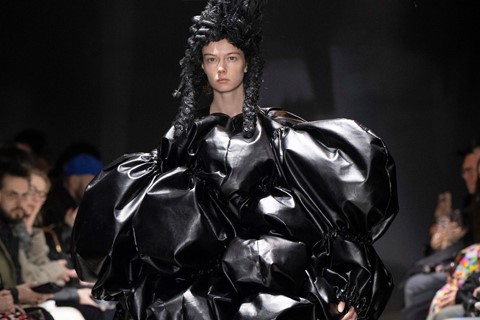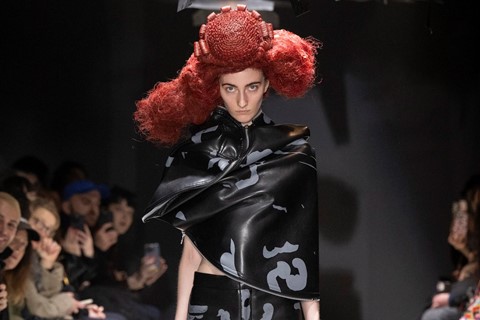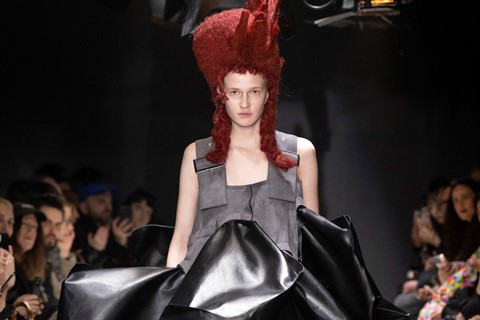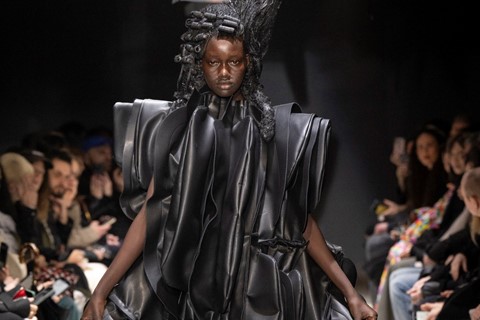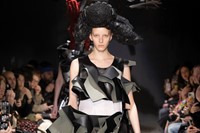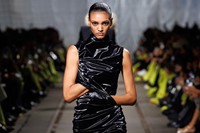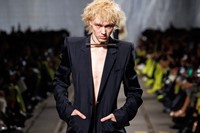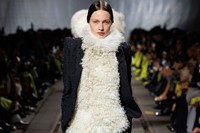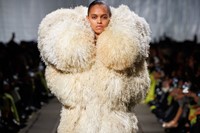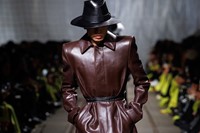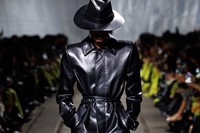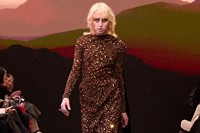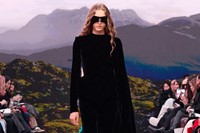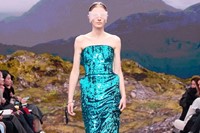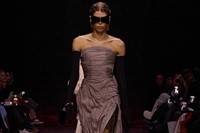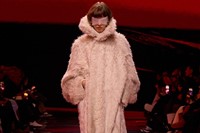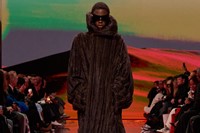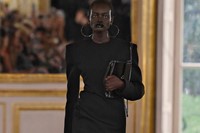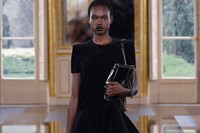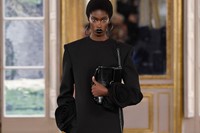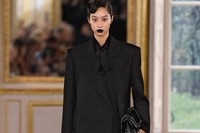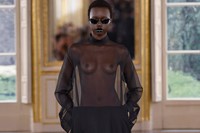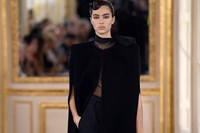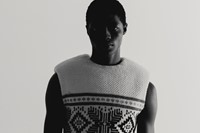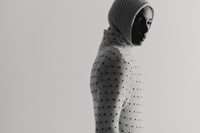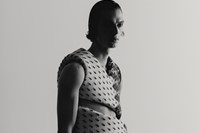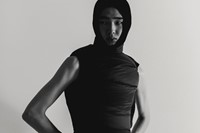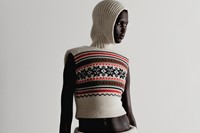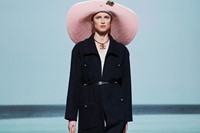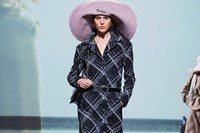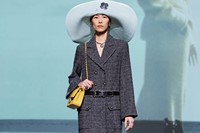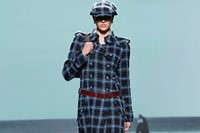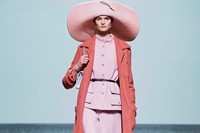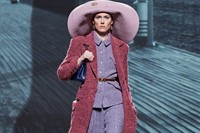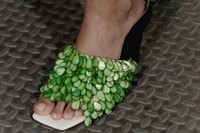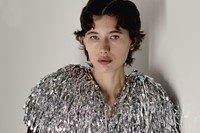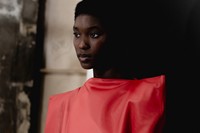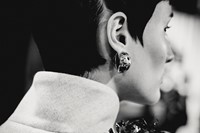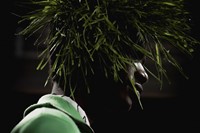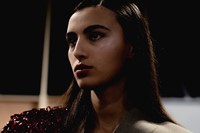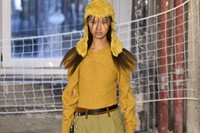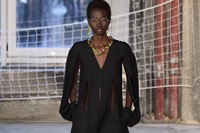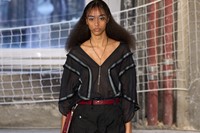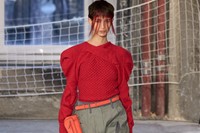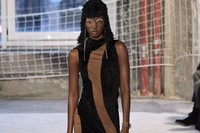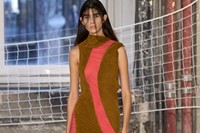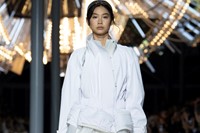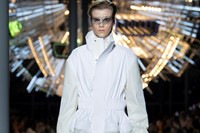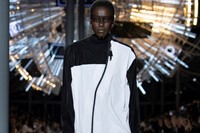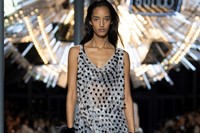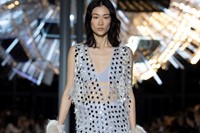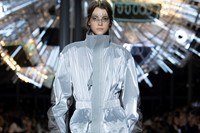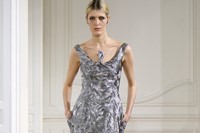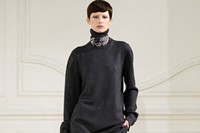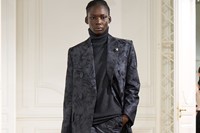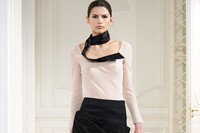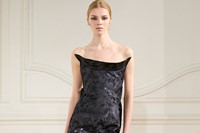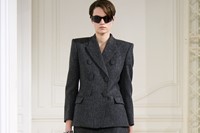Miu Miu
The Miu Miu girl that we’ve been following throughout past seasons suddenly matured into a lady for A/W24. Well, almost … for between the razor-edged pencil skirts, ‘fur’ coats made from shearling, and immaculately tailored overcoats worn by models of all ages, the collection did feature the house’s now signature ‘bottomless’ styling in the form of short, short coats and crayon-coloured tights. “Everyone can choose from them to be a child or a lady,” said Mrs Prada speaking after her flawless show. “Every single morning I decide whether I am going to be 15 years old or a lady near death.”
Dior
Miss Dior is back — but not the pink-bowed iteration from the early 00s perfume campaign. For A/W24, Maria Grazia Chiuri stepped back to 1967 and the opening of the house’s first ready-to-wear boutique, Miss Dior, under Marc Bohan. Her collection comprised of fluid, loose-fitting coats and A-line skirts in multitudes of beige, celebrating the freedom of women’s bodies as championed by the Women’s Lib movement of that era. ‘Miss Dior’ was scrawled across stockings and mini skirts — a clever nod to Bohan’s innovative printed headscarves and accessories that were also debuted with the opening of the store.
Read Alexander Fury’s review of the collection here.
Saint Laurent
Anthony Vaccarello’s latest collection for Saint Laurent was crafted almost entirely from sheer nylon stocking material. The only real hint that this was a Winter collection were a few luscious marabou jackets slung across models’ arms as they circled in razor-sharp stilettos around rooms scented with the house’s iconic Opium fragrance. Vacarello explained backstage that he “wanted to propose something that hadn’t been done before, that would get me excited. My job isn’t always to do something that’s real or realistic.”
Read Alexander Fury’s review of the collection here.
Balmain
Balmain in Bordeaux was the theme for AW24 as Olivier Rousteing paid homage to the French city where his adoptive parents raised him. If there were clichéd references to the town’s gastronomic culture (hands of grapes as a nod to its viticulture, snails to symbolise the region’s signature dish), they were gilded in such a way that felt both luxurious and relevant. Of note, was Rousteing’s play with gingham to represent the duality of his identity and to celebrate his adoptive mother, of whom he has fond memories gingerly unfolding a checkered picnic rug at family gatherings – his first sense of belonging.
Rick Owens
Showing at his home seems to have fixated Rick Owens on his beginnings in Porterville, California (his recent menswear collection was also named after his hometown). “When I’m talking about Porterville, I’m talking about oppression and intolerance,” he said backstage. “Part of my role in life is to counterbalance that with this cheerful perversity.” And perversity there was: models wore a pared-back version of his inflatable boots that debuted earlier this year, and the closing looks were mad entanglements of rubber hosing. But, as always, his muses looked like intergalactic royalty in lithe knitwear and hooded capes (recreations of some of his first designs from his days on Hollywood Boulevard).
Read Alexander Fury’s review of the collection here.
Loewe
Jonathan Anderson added yet another unexpected dimension to the world of Loewe – the closed-door interiors of old-world money. The starting point was the work of the late American painter Albert York – of whom both Anderson and Jackie Kennedy have been collectors – and which frequently adorned the chintzy interiors of 1920s society apartments. The animal tapestry and novelty floral prints that adorned his collection could have looked naff, but ever-mastered tailoring which added refreshing proportions to the chino-and-blazered silhouettes that he played with.
Read Alexander Fury’s review of the collection here.
Comme des Garçons
Rei Kawakubo is rarely forthright in her show notes. But for her latest collection, entitled Anger, she boldly, scathingly asserted: “This is about my present state of mind. I have anger against everything in the world, especially against myself.” For a collection that was breathtaking in every way – bulbous and shuddering black dresses, barbwire-printed boxed ensembles, heaving bow and flower detailing – it’s unthinkable that she could be angry with herself. However, as her models broke the fourth wall, glaring at photographers, stomping fitfully, and encroaching on spectators, it became clear that her anger was perhaps about being powerless in front of the brutality unfolding on the world’s stage.
Alexander McQueen
Before anyone had even laid eyes on his debut collection for Alexander McQueen, Sean McGirr knew that it was going to be the most controversial show of the season. The show seemed light years away from the elegant, empowered legacy of McQueen’s later works, a vision continued by Sarah Burton during her tenure – but that’s not to say it missed the mark. His opening look, a compressed latex dress, harked back to McQueen’s earliest works, while acid knits and broad leathered coats seemed to be designed for the kinds of crowds McGirr envisioned the late designer was entertaining at that time: “singular characters with really strong personalities that I’d be curious to meet on the street of London; this sort of rough glamour of the East End.”
Balenciaga
Demna has long been obsessed with modern codes of luxury (and perhaps he is partly responsible for writing them: Balenciaga has folded its way into every echelon of high-low culture). A pre-show voice note, in lieu of a written release, alluded to an old-world vision of luxury as scarcity. His collection was then ironically delivered in front of an overwhelming cacophony of attention-grabbing, AI-manipulated media. Still, his designs, and especially the cinched, pinched and warped eveningwear, stole the show – proving his point that luxury is still in the hands of rare technical geniuses like himself.
Read Alexander Fury’s review of the collection here.
Valentino
Through an all-black collection, Pierpaolo Piccioli continues his powerful and mastered rewriting of Valentino’s gendered design codes that began with his last menswear collection. There was no room for preconceived, and especially outdated, notions in his latest womenswear collection: rose ruffled sleeves further sharpened, not softened, sleek tailoring; cobwebbed lace snuck defiantly out of streamlined overcoats. The choice to create every one of the 63 looks in black (a sort of blank slate) set the house’s signature menswear and womenswear tropes on an even playing field, innovating a design vocabulary where soft, powerful, masculine, and feminine can exist fluently in one garment.
Read Alexander Fury’s review of the collection here.
Duran Lantink
A finalist for this year’s LVMH prize, Duran Lantink only goes from strength to strength with each new collection, in every sense of the word. Continuing his exploration of proportion as dimension and bulk, his A/W24 collection subverted winter uniforms like longjohns, ski suits, and knee-high socks by billowing them into perfectly padded globular forms. Using existing garments as a starting point, there was a sense of the surrealism of his forms, providing cushioning and comfort for the eyes (and mind) despite the optical illusion that his tactile manipulation of preconceived figures sets in motion.
Read AnOther’s feature on the collection here.
Chanel
Chanel’s latest spectacle opened with a short film by Inez and Vindooh featuring Brad Pitt and Penelope Cruz by the seaside. It left no mystery as to where Virginie Viard was transporting us: the ever-chic French resort town of Deauville, where Coco Chanel opened her first boutique as a millner. And, perfectly, the show began just as Chanel’s career did – with larger-than-life sunhats. The balanced collection, perhaps Viard’s best yet, featured signature tweed elongated into duster coats and heritage jersey ensembles reimagined as knitwear; each look was weighted with just the right amount of accessories and elegant platform boots.
Read Alexander Fury’s review of the collection here.
Zomer
Zomer’s second runway show (and their first on the official PFW schedule) took place within the undergrounds of the Palais de Tokyo – the white-cubed setting neatly framing their artistic collection. There were references to Lucio Fontana in sliced outerwear and bangles, and models held hand-blown glass torso ‘armour’ which were produced in collaboration with Heven by Breanna and Peter Dupont. But Danial Aitouganov and Imruh Asha’s true artistry is in their mastered bold colour palette, refreshing and invigorating amongst the tonal tides of every other runway collection.
See Paul Phung’s photo essay here.
Kiko Kostadinov
Laura and Deanna Fanning’s Kiko Kostadinov woman has always been alluringly intelligent in her complexity. AW24 saw her balancing assertively at the apex of an inner/outer world dichotomy between “strength and vulnerability”: precise incisions revealed soft pleats of colour in outerwear, mesmerising prints were pinched and warped, while corduroy was softened to follow bodily folds and silk crepes were swathed as shelter. This season debuted their first denim line in collaboration with Levis – the faux shearling-lined three-piece suit armoured the Kiko woman, ready for wherever the Fanning sisters’ genius will lead her next.
Louis Vuitton
For his 10th anniversary show as the creative director of Louis Vuitton womenswear, Nicolas Ghesquière presented a visionary collection that, despite drawing heavily on both his previous collections and the history of the house, sent itself rocketing into the future. For within a Philippe Pareno-designed domed ‘mothership,’ Ghesquière’s penchant for sci-fi weaved its way through travel-ready monogrammed tracksuits, modular sculptural dresses printed with LV heritage trunks, and otherworldly embroidered jackets inspired by his groundbreaking 2018 show at the Louvre.
Givenchy
If Givenchy is (still) yet to announce a creative director, the house is (for now) in the more-than-safe hands of its studio team. This collection proved that the team perfectly grasps the hallmark bearings of Hubert de Givenchy’s design legacy: from the opening look of an intricately silver-beaded dress (a reminder that the house has a couture atelier), to perfectly tailored jackets, and eveningwear that wisped elegantly around the model’s necks, there were all the signature flairs of Givenchy in an extraordinarily coherent vision.
